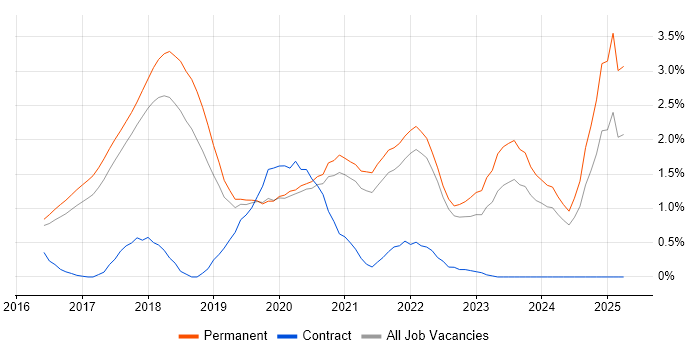Deep Learning
Cambridgeshire > Cambridge
The table below provides summary statistics for permanent job vacancies advertised in Cambridge requiring Deep Learning skills. It includes a benchmarking guide to the annual salaries offered in vacancies that cited Deep Learning over the 6 months leading up to 20 July 2025, comparing them to the same period in the previous two years.
| 6 months to 20 Jul 2025 |
Same period 2024 | Same period 2023 | |
|---|---|---|---|
| Rank | 33 | 67 | 65 |
| Rank change year-on-year | +34 | -2 | +37 |
| Permanent jobs citing Deep Learning | 14 | 8 | 15 |
| As % of all permanent jobs advertised in Cambridge | 4.44% | 0.88% | 2.12% |
| As % of the Processes & Methodologies category | 4.73% | 1.09% | 2.23% |
| Number of salaries quoted | 1 | 7 | 14 |
| 10th Percentile | - | £74,500 | £48,250 |
| 25th Percentile | £96,250 | £78,750 | £62,500 |
| Median annual salary (50th Percentile) | £102,500 | £80,001 | £75,000 |
| Median % change year-on-year | +28.12% | +6.67% | - |
| 75th Percentile | £108,750 | £85,000 | £91,250 |
| 90th Percentile | - | £91,000 | £100,250 |
| Cambridgeshire median annual salary | £102,500 | £80,001 | £75,000 |
| % change year-on-year | +28.12% | +6.67% | - |
All Process and Methodology Skills
Cambridge
Deep Learning falls under the Processes and Methodologies category. For comparison with the information above, the following table provides summary statistics for all permanent job vacancies requiring process or methodology skills in Cambridge.
| Permanent vacancies with a requirement for process or methodology skills | 296 | 732 | 673 |
| As % of all permanent jobs advertised in Cambridge | 93.97% | 80.62% | 95.33% |
| Number of salaries quoted | 193 | 565 | 304 |
| 10th Percentile | £26,250 | £33,250 | £30,000 |
| 25th Percentile | £30,000 | £43,375 | £40,000 |
| Median annual salary (50th Percentile) | £50,000 | £60,000 | £55,250 |
| Median % change year-on-year | -16.67% | +8.60% | +0.45% |
| 75th Percentile | £62,500 | £77,500 | £75,000 |
| 90th Percentile | £77,500 | £85,000 | £87,500 |
| Cambridgeshire median annual salary | £50,000 | £55,000 | £54,000 |
| % change year-on-year | -9.09% | +1.85% | +2.86% |
Deep Learning
Job Vacancy Trend in Cambridge
Job postings citing Deep Learning as a proportion of all IT jobs advertised in Cambridge.

Deep Learning
Salary Trend in Cambridge
3-month moving average salary quoted in jobs citing Deep Learning in Cambridge.
Deep Learning
Co-occurring Skills and Capabilities in Cambridge by Category
The follow tables expand on the table above by listing co-occurrences grouped by category. The same employment type, locality and period is covered with up to 20 co-occurrences shown in each of the following categories:
